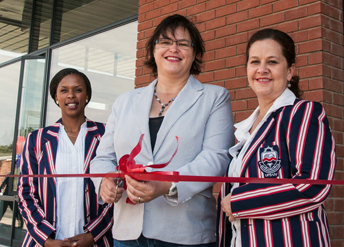
From the left: Mamosa Makaya, Deputy Director: Integrated Communication; Prof Corli Witthuhn, Vice-Rector: Research; and Lacea Loader, Director: Communication and Brand Management at the opening of the Visitors Centre. |
Welcoming point to the Bloemfontein Campus for national and international visitors
Each year our university welcomes numerous visitors onto the Bloemfontein Campus – be they conference delegates, prospective students, parents or service providers. As part of the university’s greater plan of access control and securing the campus for its staff, students and visitors, a Visitors Centre was built at the DF Malherbe gate. The Department of Communication and Brand Management officially opened the new Visitors Centre on 27 November 2014.
In partnership with Protection Services, visitors are now registered and issued with temporary cards to gain access to various parts of the campus. Visitors will also be able to obtain directions and a copy of the campus map at the centre.
The design of the building not only lends a modern, spacious feeling to the centre, but supports green energy as well. Also located at the Visitors Centre is the university switchboard which is the first point of contact for enquiries.
The centre will in future be the welcoming point for larger delegations and visiting groups, nationally and internationally.
For enquiries about the Visitors Centre contact: Mamosa Makaya, Deputy Director: Integrated Communication, at +27(0)51 401 9188 or email makayam@ufs.ac.za.
Visitors Centre front desk: +27(0)51 401 7766.